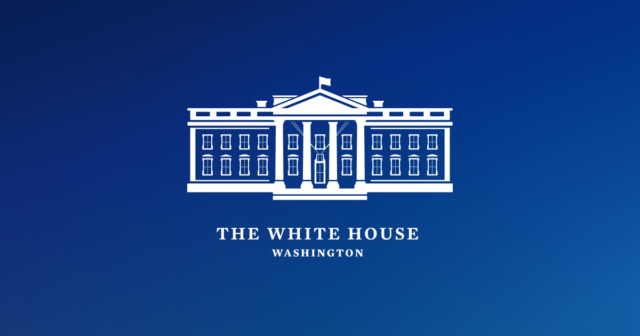
The Biden-Harris Administration launched a new era in public-private partnerships, forging innovative, high-impact, and multisector partnerships to advance U.S. foreign policy and national security.
In one of his earliest national security memoranda, President Biden acknowledged that “government alone cannot solve the complex challenges the United States faces at home and abroad. In addition to restoring bilateral and multilateral alliances, the United States must bring to bear the ideas, perspectives, and contributions of a diverse array of sub-national and non-governmental partners…”
In that spirit, the Biden-Harris Administration made unprecedented use of public-private partnerships to advance key interests on every continent and nearly every major issue. Public-private partnerships have been a feature of nearly every major White House initiative. These partnerships have helped us effectively engage in strategic competition – economic, military, ideological, and competition to shape the future of the international order – fostering global cooperation around shared threats and challenges, like climate change, pandemic prevention, and countering transnational criminal activity.
Beyond launching high-impact partnerships, the Biden-Harris Administration also made generational strides in building partnership capacity and fostering a partnership culture across the federal government. This Administration spurred the creation of formal partnership offices in several federal agencies and the maturation of over a dozen more. Public-private partnership is, for the first time, a tool that nearly all national security agencies are resourced and empowered to use.
The Biden-Harris Administration’s expansive scope and scale of public-private partnerships has allowed us to be better positioned to outmaneuver our geopolitical competitors, while leading global efforts to tackle shared challenges. This approach has and will continue to pay off for the American people.
BY THE NUMBERS
- Leveraging Private Funding: Since FY 2021, the Biden-Harris Administration has leveraged or received commitments of more than $97 billion from private sector, philanthropy, and civil society partners.
- Launching New Partnerships: The Biden-Harris Administration established more than 1,400+ new partnerships programs, engaging more than 4,400+ distinct partners across private sector, philanthropy, and civil society.
- Global Reach: Public-private partnerships with federal agencies are operating in communities across more than 130 countries.
FEATURED PARTNERSHIP AREAS
- Catalyzing High-Quality Infrastructure Investment: The Biden-Harris Administration has led the G7 to invest in low- and middle-income countries through the flagship initiative Partnership for Global Infrastructure and Investment (PGI). Over the last three years, the United States alone has mobilized more than $80 billion towards PGI investments through federal financing, grants, and leveraged private sector contributions, including investments focused on the partner economies of the Indo-Pacific Economic Framework (IPEF), and across sub-Saharan Africa. This includes the development of food production and energy infrastructure in the Lobito Trans-Africa Corridor, the first open-access transcontinental rail network in Africa, and the Luzon Economic Corridor in the Philippines.
- Driving Regional Entrepreneurship and Investment: The United States has led efforts to create diversified and resilient regional supply lines, as well as efforts to train an inclusive and diverse cohort of entrepreneurs. The investor network component of the Americas Partnership for Economic Prosperity (APEP) is promoting a robust and inclusive entrepreneurial landscape in the Western Hemisphere by bridging investment gaps and connecting Latin American and Caribbean entrepreneurs with strategic investors, mentors, and resources, already having pledged $1.7 billion and deployed over $92 million. The Biden-Harris Administration also partnered with the Inter-American Development Bank (IDB), which is conducting competitiveness studies of APEP countries that will facilitate the establishment of integrated regional value chains in three critical areas: medical supplies, semiconductors, and critical minerals.
- Global COVID Response: During the first and second Global COVID Summits, President Biden announced more than $2 billion in private and philanthropic sector commitments to support the global COVID response through vaccination efforts, concessionary pricing of therapeutics, vaccine awareness campaigns, and health worker support initiative. Project Last Mile is continuing this work.
- Tackling the Climate Crisis: The Biden-Harris Administration has supplemented the investments of the Inflation Reduction Act with international partnerships to combat the climate crisis. At COP26, President Biden released the President’s Emergency Plan for Adaptation and Resilience (PREPARE) to help more than half a billion people in developing countries adapt to and manage the impacts of climate change. The plan includes partnerships between private sector and the DFC to invest in climate resilience. Since November 2022, 40 companies and partners have made voluntary commitments to build climate resilience around the world and these efforts will mobilize more than $3 billion in additional support to help people better manage the impacts of climate change.
Promoting Rights and Opportunities for Women and Girls: The Biden-Harris Administration advanced gender equality globally, launching initiatives to increase women’s economic security, address gender-based violence, promote women’s participation in peace and security processes, and advance women’s leadership and human rights. The Administration mobilized over $2 billion in private resources to close gender gaps online through the Women in the Digital Economy initiative and in green and blue sectors through the Women in the Sustainable Economy initiative.
- Building Regional Disaster Resilience: In addition to tackling the climate crises abroad, the Biden-Harris Administration is implementing strategies to ensure that states, counties, tribal lands, and U.S. territories are better prepared before natural disasters occur here at home. FEMA alone has over 3,000 local partners across the United States and abroad in its work to prepare for, respond, recover from disasters. This includes partnerships that provide investments in training for caregivers to plan for patient needs during a disaster; the launching of Community Disaster Resilience Zones (CDRZ) to help state and local authorities identify the most at risk and in-need communities to prioritize public and private resources; and increasing regional capacity for response and recovery activities during declared emergencies or disasters, through the Mission Ready Venues partnership. This partnership with the National Football League authorizes large sports venues to serve as emergency shelters, staging areas, commodity distribution sites, evacuation pick up points, disaster recovery centers, mass vaccination and testing, temporary hospitals, and more.
- Addressing Food Insecurity: Fostering public-private partnerships has been a critical tool of the Biden-Harris Administration in combatting global food insecurity and ensuring inclusive economic growth. Feed the Future, the U.S. government’s flagship global hunger and food security initiative, has leveraged more than $6 billion in private sector commitments, mitigating the hunger crises for millions of people around the world. Funding support to agribusiness entrepreneurs through the U.S.-African Union Strategic Partnership helps to diversify food supply markets. Other efforts, like PGI, have helped mobilize over $1 billion in U.S. investments to spur inclusive economic growth, fund reliable roads, digital agriculture financing, food processing facilities, and irrigation projects in developing partner countries.
- Providing a Beacon of Hope for Refugees and Welcoming Our Afghan Allies: The Biden-Harris Administration has rebuilt partnerships with refugee resettlement agencies, civil society, the private sector, faith communities, and veterans to continue the long tradition of the United States as a leader in refugee resettlement. In FY 2024, this public-private partnership welcomed more than 100,000 refugees from around the world, the most in a single year in three decades. The Administration has also partnered to welcome more Afghan Special Immigrant Visa holders than all other administrations combined. Building from whole-of-society efforts to welcome Afghan newcomers, the Administration created the Welcome Corps to enable ordinary Americans to sponsor refugees and Afghan Special Immigrant Visa holders into their communities. The Department of State also formed a unique partnership with the #AfghanEvac Coalition to support the resettlement of our Afghan allies.
- Managing Regional Migration: Under the Los Angeles Declaration on Migration and Protection, the Biden-Harris Administration has brought together 22 hemispheric partners behind a shared approach to advance safe, humane, and orderly migration. Public-private partnerships have been critical to implementing the LA Declaration, which has helped leverage private sector and multilateral institutions to support efforts by host communities within Latin America and the Caribbean to stabilize and integrate millions of migrants. The public-private partnership known as Central America Forward, launched in response to Vice President Harris’s Call to Action for Northern Central America, generated more than $5.2 billion in new commitments from more than 50 companies and organizations in support of inclusive economic growth in the region.
- Digital Connectivity & Economic Growth Across the Global South: The Biden-Harris Administration has partnered with companies, philanthropies, and multinational development banks to accelerate the economic growth and digital connectivity of partners across the Global South. As the 2023 APEC Host, the Administration generated $50 billion in new U.S. private sector investments into Indo-Pacific countries including nearly $25 billion to increase digital connectivity including sub-sea cables. As part of her historic trip to Africa, Vice President Harris galvanized U.S., African, and global private sector investments for the Continent, including more than $7 billion in climate adaptation, resilience, and mitigation commitments and $1 billion in commitments to advance women’s economic security and close the gender digital divide in Africa. Building on these efforts, in May 2024 the Vice President launched two new public-private partnerships to advance digital access and inclusion in Africa. Since 2021, the U.S. Government has helped close 1,882 deals across 42 countries for a total estimated value of $72.3 billion across Africa, including through Digital Transformation with Africa (DTA) Initiative, U.S.-Africa Clean-Tech Energy Network (CTEN), and the Africa Tech for Trade Alliance.
- Advancing American Competitiveness and Security Across Supply Chains & Tech: The Biden-Harris Administration has fundamentally revised the U.S. approach to technology and national security and recognizes that economic competitiveness and national security depend on our ability to build secure and sustainable supply chains for the technologies necessary to power our future. Not only has this Administration made historic investments totaling $395 billion through the CHIPS and Science Act to secure U.S. global leadership in advanced technology like Artificial Intelligence (AI), but it has utilized partnerships with industry-leading technology companies to effectively out-compete other nations, increase our innovative capacity, and establish secure, high-tech supply chains. The NSF launched the National Artificial Intelligence Research Resource Pilot and the National Artificial Intelligence Research Institutes partnerships to support AI research to advance safe, secure and trustworthy AI, as well as the application of AI to challenges in healthcare and environmental and infrastructure sustainability. Additionally, the United States, Japan, United Kingdom, France, and Canada- via the “Sapporo 5” partnership successfully mobilized over $5.6 billion in public and private investments to expand uranium enrichment services for the civil nuclear sector and build a peaceful nuclear energy supply chain free from Russian influence.
- Securing our Digital House: The Administration is locking America’s digital doors to threats of manipulation, scamming, theft, and disruption by malicious cyber actors, including by taking unprecedented action with the private sector to protect America’s critical infrastructure. Public-private partnerships have provided grants and discounts on security products optimized for smaller hospitals and provided free and low-cost cybersecurity resources to school districts. The Administration has launched the U.S. Cyber Trust Mark a voluntary certification and labeling program that raises the bar for cybersecurity across common consumer smart devices. The USG has also partnered with the tech industry to fight cryptocurrency finance crime and ransomware, standing up a partnership for rapid tracing and interdiction under the Illicit Virtual Asset Notification (IVAN) program.
###
Mortgage News From Whitehouse.gov









